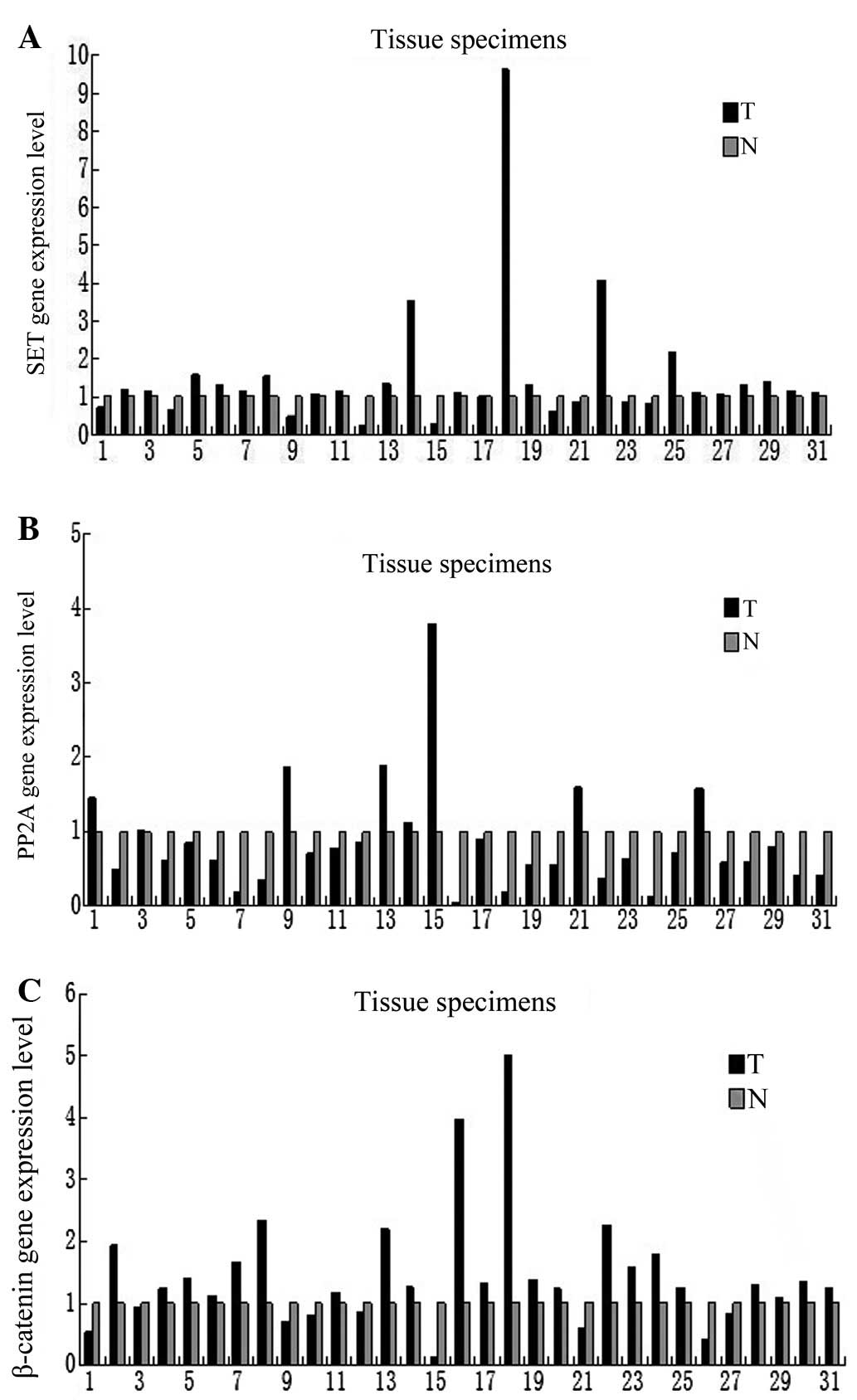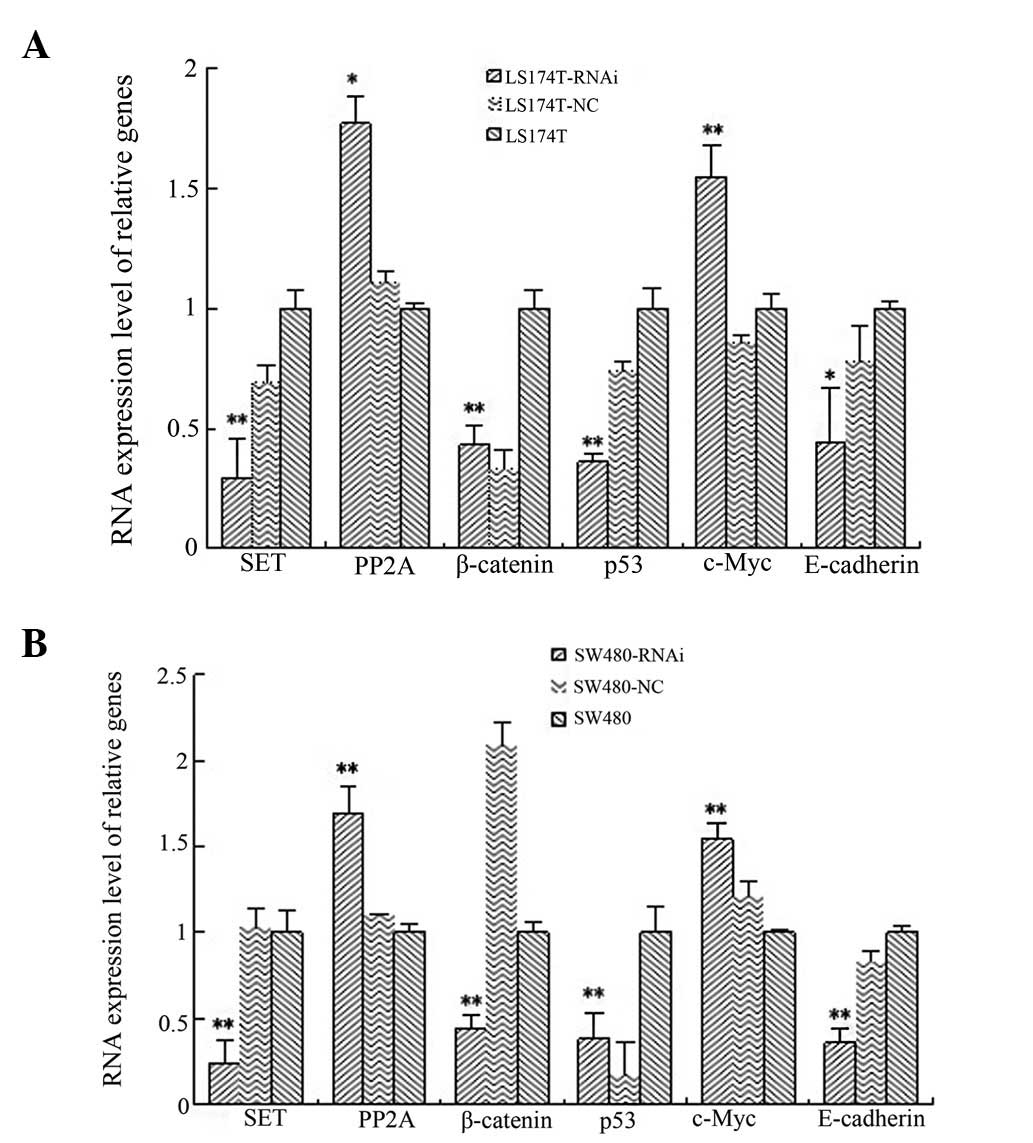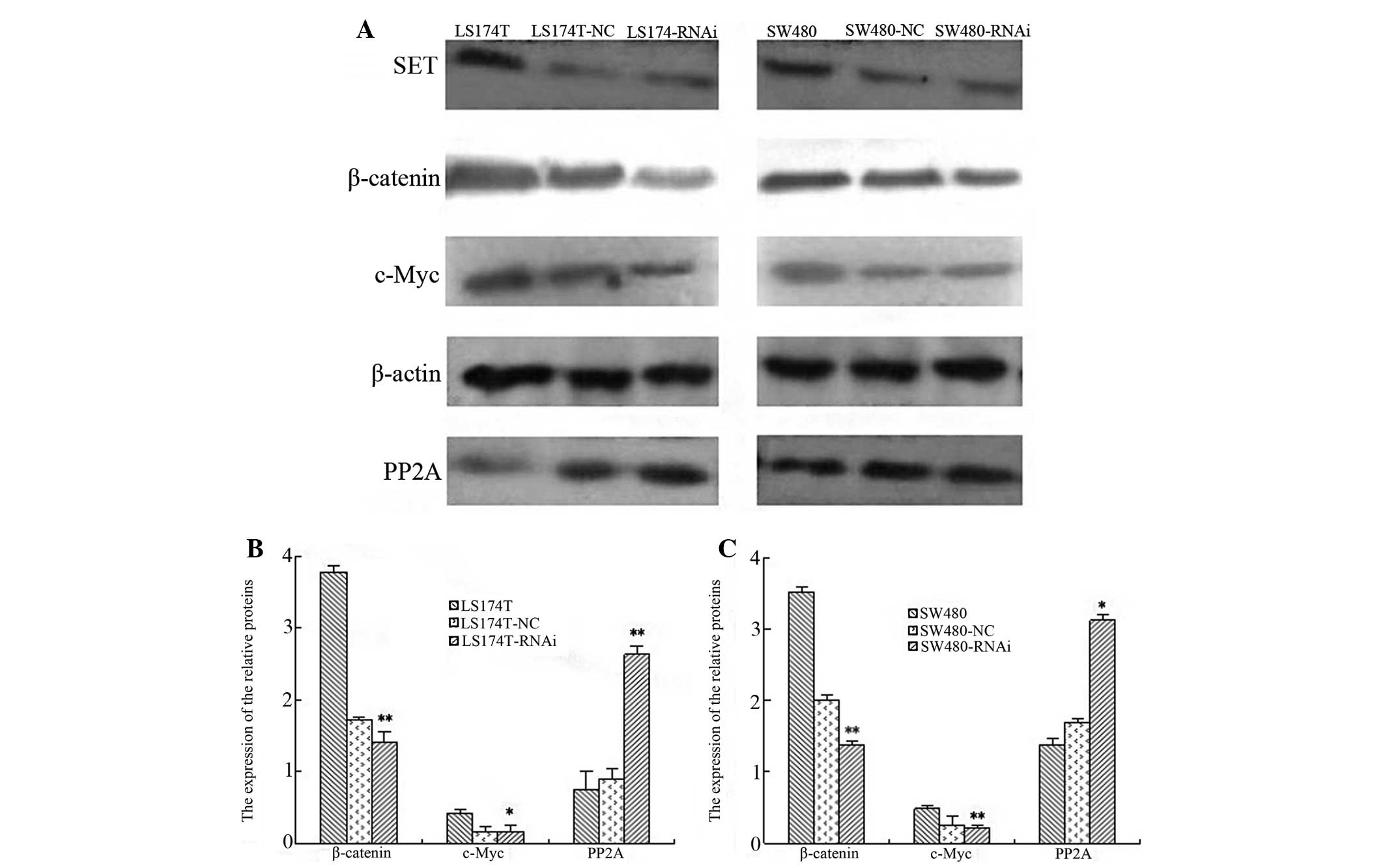|
1
|
Bosetti C, Levi F, Rosato V, Bertuccio P,
Lucchini F, Negri E and La Vecchia C: Recent trends in colorectal
cancer mortality in Europe. Int J Cancer. 129:180–191. 2011.
View Article : Google Scholar : PubMed/NCBI
|
|
2
|
Shu Z and Shanrong C: Colorectal cancer
epidemiology and prevention study in China. Chin Ger J Clin Oncol.
2:72–75. 2003. View Article : Google Scholar
|
|
3
|
Chen Y, Zhang YZ, Zhou ZG, et al:
Identification of differentially expressed genes in human
colorectal adenocarcinoma. World J Gastroenterol. 12:1025–1032.
2006.
|
|
4
|
von Lindern M, van Baal S, Wiegant J, Raap
A, Hagemeijer A and Grosveld G: Can, a putative oncogene associated
with myeloid leukemogenesis, may be activated by fusion of its 3′
half to different genes: characterization of the set gene. Mol Cell
Biol. 12:3346–3355. 1992.PubMed/NCBI
|
|
5
|
Li M, Makkinje A and Damuni Z: The myeloid
leukemia-associated protein SET is a potent inhibitor of protein
phosphatase 2A. J Biol Chem. 271:11059–11062. 1996. View Article : Google Scholar : PubMed/NCBI
|
|
6
|
Jiang Q, Zhang C, Zhu J, Chen Q and Chen
Y: The SET gene is a potential oncogene in human colorectal
adenocarcinoma and oral squamous cell carcinoma. Mol Med Rep.
4:993–999. 2011.PubMed/NCBI
|
|
7
|
Van Vlierberghe P, van Grotel M, Tchinda
J, et al: The recurrent SET-NUP214 fusion as a new HOXA activation
mechanism in pediatric T-cell acute lymphoblastic leukemia. Blood.
111:4668–4680. 2008.PubMed/NCBI
|
|
8
|
Quentmeier H, Schneider B, Röhrs S, Romani
J, Zaborski M, Macleod RA and Drexler HG: SET-NUP214 fusion in
acute myeloid leukemia and T-cell acute lymphoblastic
leukemia-derived cell lines. J Hematol Oncol. 2:32009. View Article : Google Scholar : PubMed/NCBI
|
|
9
|
Ouellet V, Le Page C, Guyot MC, LuSSier C,
Tonin PN, Proveneher DM and Mes-Masson AM: SET complex in serous
epithelial ovarian cancer. Int J Cancer. 119:2119–2126. 2006.
View Article : Google Scholar : PubMed/NCBI
|
|
10
|
Bustin SA, Benes V, Garson JA, et al: The
MIQE guidelines: minimum information for publication of
quantitative real-time PCR experiments. Clin Chem. 55:611–622.
2009. View Article : Google Scholar : PubMed/NCBI
|
|
11
|
Nolan T, Hands RE and Bustin SA:
Quantification of mRNA using real-time RT-PCR. Nat Protoc.
1:1560–1581. 2006. View Article : Google Scholar
|
|
12
|
Kim DW, Kim KB, Kim JY, Lee KS and Seo SB:
Negative regulation of neuronal cell differentiation by INHAT
subunit SET/TAF-Iβ. Biochem Biophys Res Commun. 400:419–425.
2010.PubMed/NCBI
|
|
13
|
Cristóbal I, Garcia-Orti L, Cirauqui C,
Cortes-Lavaud X, García-Sánchez MA, Calasanz MJ and Odero MD:
Overexpression of SET is a recurrent event associated with poor
outcome and contributes to protein phosphatase 2A inhibition in
acute myeloid leukemia. Haematologica. 97:543–550. 2012.
|
|
14
|
Neviani P, Santhanam R, Trotta R, et al:
The tumor suppressor PP2A is functionally inactivated in blast
crisis CML through the inhibitory activity of the BCR/ABL-regulated
SET protein. Cancer Cell. 8:355–368. 2005. View Article : Google Scholar : PubMed/NCBI
|
|
15
|
Janssens V and Goris J: Protein
phosphatase 2A: a highly regulated family of serine/threonine
phosphatases implicated in cell growth and signalling. Biochem J.
353:417–439. 2001. View Article : Google Scholar : PubMed/NCBI
|
|
16
|
Arroyo JD and Hahn WC: Involvement of PP2A
in viral and cellular transformation. Oncogene. 24:7746–7755. 2005.
View Article : Google Scholar : PubMed/NCBI
|
|
17
|
Janssens V, Goris J and Van Hoof C: PP2A:
the expected tumor suppressor. Curr Opin Genet. 15:34–41. 2005.
View Article : Google Scholar : PubMed/NCBI
|
|
18
|
Arnold HK and Sears RC: Protein
phosphatase 2A regulatory subunit B56alpha associates with c-myc
and negatively regulates c-myc accumulation. Mol Cell Biol.
26:2832–2844. 2006. View Article : Google Scholar : PubMed/NCBI
|
|
19
|
Polakis P: Wnt signaling and cancer.
Genes. 14:1837–1851. 2000.
|
|
20
|
He TC, Sparks AB, Rago C, et al:
Identification of c-myc as a target of the APC pathway. Science.
281:1509–1512. 1998. View Article : Google Scholar : PubMed/NCBI
|
|
21
|
de La Coste A, Romagnolo B, Billuart P, et
al: Somatic mutations of the beta-catenin gene are frequent in
mouse and human hepatocellular carcinomas. Proc Natl Acad Sci USA.
95:8847–8851. 1998.PubMed/NCBI
|
|
22
|
Yeh E, Cunningham M, Arnold H, et al: A
signalling pathway controlling c-Myc degradation that impacts
oncogenic transformation of human cells. Nat Cell Biol. 6:308–318.
2004. View
Article : Google Scholar
|
|
23
|
Willert K, Shibamoto S and Nusse R:
Wnt-induced dephosphorylation of axin releases beta-catenin from
the axin complex. Genes. 13:1768–1773. 1999. View Article : Google Scholar : PubMed/NCBI
|
|
24
|
Behrens J, Jerchow BA, Würtele M, et al:
Functional interaction of an axin homologconductin, with β-catenin,
APC and GSK3β. Science. 280:596–599. 1998.
|
|
25
|
Huang H and He X: Wnt/β-catenin signaling:
new (and old) players and new insights. Curr Opin Cell Biol.
20:119–125. 2008.
|
|
26
|
Bienz M and Clevers H: Linking colorectal
cancer to Wnt signaling. Cell. 103:311–320. 2000. View Article : Google Scholar : PubMed/NCBI
|
|
27
|
Tian X, Liu Z, Niu B, et al:
E-cadherin/β-catenin complex and the epithelial barrier. J Biomed
Biotechnol. 2011:5673052011.
|
|
28
|
Koldobskiy MA, Chakraborty A, Werner JK
Jr, et al: p53-mediated apoptosis requires inositol
hexakisphosphate kinase-2. Proc Natl Acad Sci USA. 107:20947–20951.
2010. View Article : Google Scholar
|

















